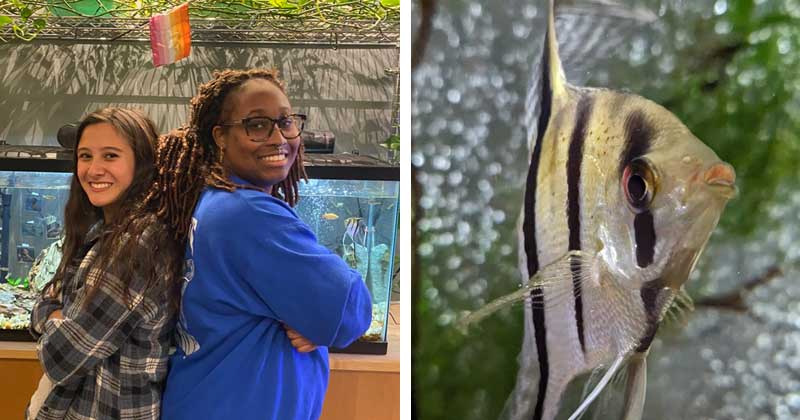
Category: Earth, Ocean and Environment

Using Fish to Create Change on Campus
March 15, 2024 Written by Risha Inaganti
Walking through the fourth floor of the Harker Interdisciplinary Science and Engineering Laboratory (ISE Lab) during their freshman year, Alyssa Wentzel noticed something peculiar – a nearly empty fish tank with a lone fish named Oscar.
Curiosity getting the best of Wentzel, they asked around and found out that the tank belonged to a now defunct biology lab.
Noticing a need on the Newark campus for more hands-on marine science experiences accessible to students, Wentzel, the founder and co-president of the Aquatic Project thought , “Why not develop something on campus where students here can get more exposure?”
Wentzel started by procuring funding from an ISE Lab manager to develop a team of students and slowly bring in fish and plants. When interest started picking up, Wentzel, a junior majoring in marine science and public policy, decided to turn the group into a Registered Student Organization (RSO). After gaining signatures and working with the Student Life Coordinator, the Aquatic Project was off and running by February 2022.
The Aquatic Project is now responsible for maintaining a variety of fish tanks on the fourth floor of ISE Lab. They work to expose students to hands-on experience through weekly tank maintenance – a process that includes water quality testing, feeding and aquascaping. Aquascaping, according to Wentzel, is the process of setting up a fish tank with various elements such as plants, stones and substrates.
The following semester, Wentzel met future co-president Ambre Crawford. Crawford, a sophomore majoring in marine science with a biology concentration, joined the club with no experience in fish care. After spending the semester learning the basics on fish tank maintenance, Crawford became the student intern before stepping up to co-president.
Wentzel and Crawford wanted to make sure the Aquatic Project was more than mere fish tanks.
While UD’s Lewes Campus is home to most of the University of Delaware’s marine biology equipment, they hoped to provide more opportunities for Newark-based students.
“While we started as just maintaining some tanks in ISE, we really worked to make sure there were opportunities for students who may have not gotten many aquatic experiences growing up,” Wentzel said. As someone who grew up in a landlocked area themself, Wentzel said, “It was important for me to help others realize that even though you may come from an area that doesn’t have access to the ocean, you can still find opportunities and a way to make marine conservation changes.”
With that in mind, the two co-presidents began to increase educational opportunities within the club. They began quiz-formatted game nights, with activities such as Kahoot and mini-Jeopardy, and Crawford began giving weekly fish lessons.
“I started an activity called ‘Fish of the Week,’” Crawford said. “I made a list of every fish species I can think of and spin the wheel at every meeting so that we can learn about a new fish each week. Right now, we’re at 530 fish types.”
Additionally, the club began field trips to places like That Fish Place – That Pet Place, in Lancaster, Pennsylvania, and the Adventure Aquarium in Camden, New Jersey. At the Adventure Aquarium, the Aquatic Project received a behind the scenes tour, learning about various careers in aquariums and new techniques on aquatic care.
In addition to increasing education, the club began working to expand their teachings to a different skill – swim lessons.
“Quite a few of our members are unfamiliar with swimming,” Wentzel said. “Some have never even been in a body of water before. While we wanted to give exposure to swimming for the sake of the Aquatic Project theme, we also recognized swimming as an important life skill, and we’re happy to be able to provide these lessons.”
The swim lessons are taught by Daniel Vaizman, the club’s head technician, and Kat Terhune, the club’s vice president. All lessons take place in the University pool at the Carpenter Sports Building.
The biggest event for the Aquatic Project was a coral fragging event last fall. According to Crawford, coral fragging is a process where you take the mother colony of a coral and cut it in order to form other small pieces of coral and help the coral form new colonies. This event had double the number of attendees as their normal events and the success helped them realize there was a wide interest in marine conservation efforts around campus.
Crawford and Wentzel are currently working on ways to improve the diversity and inclusion of marine science spaces.
“Sadly enough, the marine science field is often viewed as one that is inaccessible and that’s only allowed for certain people,” Wentzel said. “Our club stands to say that people coming from minority backgrounds or areas of financial burden can still be successful in this field.”
The co-presidents, who both come from minority backgrounds, reiterated that the Aquatic Project’s main focus is to provide students with opportunities that they may not have otherwise received, due to location, background or finances.
With ten board members and meeting attendees from all different parts of campus, Wentzel emphasized how they are “in awe of how far the club has come.”
While the lonely Oscar that Wentzel first saw in ISE Lab is no longer alive, the fourth floor now brims with fish tanks of various sizes, filled with colorful fish and luscious plants.
“We’ve had so many people tell us that these fish tanks have created a safe space for them,” Crawford said. “Knowing that the Aquatic Project has helped create a calming atmosphere is such an amazing feeling.”
